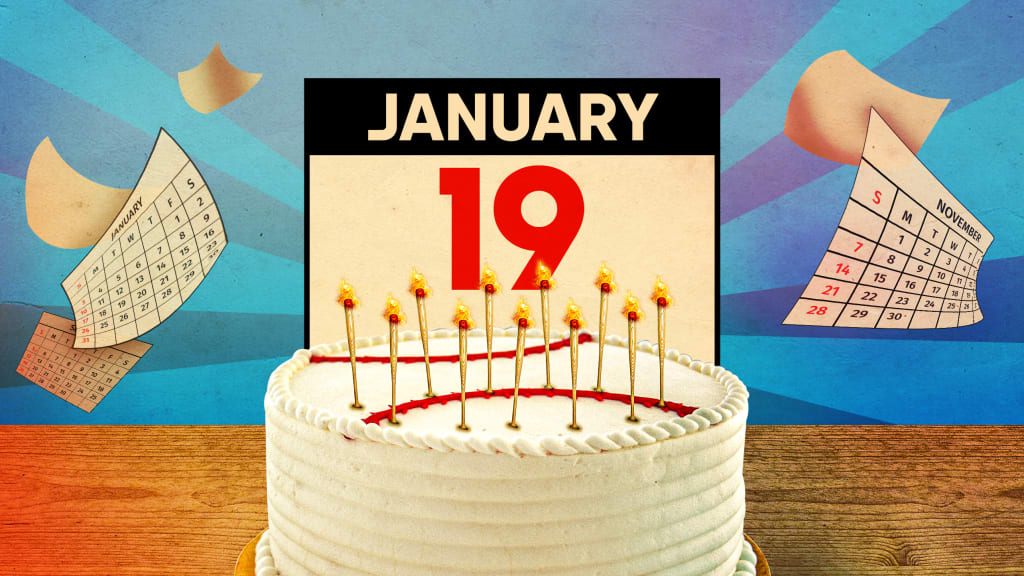
Who are the best players born on each day of the year? We have a list for every day on the calendar.
Here’s a subjective ranking of the top five for Jan. 19.
1) Jon Matlack (1950)
The Mets have had two absolute golden seasons: 1969 and 1986. Matlack showed up two years after the former and retired three years before the latter (though he was pitching for Texas by then). No matter: After winning a Rookie of the Year Award, notching three All-Star berths and helping the Mets reach the 1973 World Series, his place in team history remains quite prominent.
Matlack was ahead of his time as a textbook example of win-loss record not necessarily reflecting a pitcher's caliber. Matlack's record in 13 seasons in the bigs was 125-126, though his career ERA was a superb 3.18. He only pitched in the postseason once, but posted a sterling 1.40 ERA in four starts.
The Mets' hallmark has always been their starting pitching: They have a history of some of the finest arms the sport has to offer. Matlack gets overshadowed by some of those bold-faced names, but his 39.4 WAR ranks him seventh among pitchers in team history, a hair behind Sid Fernandez and Al Leiter, which isn't a terrible place to be. He wasn't Seaver, Koosman, Gooden or deGrom, for certain -- but real Mets fans know he's an important part of the team's fabric.
2) Chris Sabo (1962)
If you collected baseball cards in the late 80's/early 90's, there was a good chance you were drawn to Sabo, a good player with a great nickname (Spuds, after then-iconic Budweiser mascot Spuds Mackenzie) and a very distinctive look: a flat top haircut and a pair of ubiquitous Rec Specs. As such, he was the inadvertent hero of countless bespectacled elementary school athletes forced to wear the same.
Sabo, also an excellent hockey player as a kid, flourished on the Michigan baseball team, which finished third in the 1983 College World Series. (In a harbinger, he shared an infield with future Reds teammate Barry Larkin.) Drafted by Cincinnati, he made the 1988 team purely on grit and was a sensation, stealing 42 bases, making the NL All-Star team and winning Rookie of the Year.
Sabo's high point came in 1990-91: He was an All-Star both years, and he helped the Reds upset the A's in the '90 World Series. But his body betrayed him: After a solid 1993 season, he never played more than 68 games again. He fittingly returned to the Reds for his final season in 1996.
In 2018, Sabo was hired as the head coach to revive the Akron University baseball team, which had been eliminated three years earlier, and served in that role through the end of the 2022 season. He remains a sweet memory for anyone who still has a binder in their basement full of his cards.
3) Jim Morris (1964)
OK, stop us if you've heard this one. A promising young pitcher got drafted by a Major League team, but his arm went and he maxed out at the Class A level. It happens. So he settled down with his family in Texas, became a science teacher and coached some baseball on the side.
Meanwhile, he got healthy and his arm still had some lightning left. So he ended up cutting a deal with his high school players: If they won the district championship, which they'd never done, he'd try out for an MLB team. Sure enough, they did just that.
The teacher went to a tryout with the Rays and to everyone's amazement, including his own, he hit 98 mph 12 times in a row. The team offered him a contract, and he went from Double-A to Triple-A to the Majors, where he struck out his first MLB batter at age 35.
If that sounds like a Disney movie, well, it was one. And though Morris' time in the Majors didn't last long, he's enjoyed a nice post-baseball career as a motivational speaker with a terrific story to tell.
4) Phil Nevin (1971)
Nevin overcame several childhood afflictions -- asthma and an allergy to grass (!) -- to become a star scholastic athlete, excelling at baseball and as a kicker on the football team. (He drilled a 57-yard field goal in high school.) He continued playing both sports in college to great effect; he was first-team all-conference at Cal-State Fullerton as a kicker, and led the baseball team to the championship game of the College World Series.
Nevin chose baseball, a good move; he was picked first overall in the 1992 Draft by the Astros, and starred that summer for Team USA in the Barcelona Olympics. But he wouldn't find MLB success until seven years later for the Padres, his fourth team. Nevin maxed out with 41 homers in 2001, his lone All-Star season. His son, Tyler, has followed in his footsteps.
Nevin was retired by 2006, transitioning into roles as an analyst and a coach. In 2022, he was named interim manager of the Angels after Joe Maddon was dismissed, and he managed the club through the end of the 2023 season.
5) Byung-Hyun Kim (1979)
It seems unfair to be more known for your failures than your successes -- neither were insignificant -- but that's the case with Kim. The South Korea native was an All-Star closer for the D-backs and anchored the bullpen for their World Series team in 2001. But he also gave up absolutely crushing home runs in both Games 4 and 5, including the iconic Mr. November homer hit by Derek Jeter. (Less memorable but still notable, he surrendered Barry Bonds' 715th home run, breaking a tie with Babe Ruth for second all-time.)
Kim pitched in the Majors until 2014, before bouncing around the world a bit. He last pitched in Australia in 2019.
Others of note:
Anthony Young (1966)
Young holds an inauspicious distinction: He holds the Major League record with 27 straight decision losses, many in relief. Ironically, he was actually a pretty good pitcher -- though the Mets team behind him was not great, which certainly didn't help. To his credit, Young always maintained a great attitude, even appearing on Jay Leno's show after the comedian had used him as a punching bag throughout the streak.
"Everything that could happen, happened," Young told the Daily News in 2009. "It was just destiny, I guess."
Sadly, Young passed away from a brain tumor at age 51 in 2017.
Fred Valentine (1935)
Valentine grew up watching Satchel Paige and Hank Aaron playing in the Negro Leagues, and he eventually followed in their footsteps as a pioneer in the Majors. Respected as a ballplayer and a leader, Valentine actually helped integrate the stands in Greensboro while he was in the Carolina League. He played seven seasons for the Orioles and Senators, earning MVP votes in 1966, when he hit a career-high 16 homers. Valentine stayed involved and influential after his career, helping to found the MLBPA Alumni Association.
Dib Williams (1910)
We can all think of examples where someone is expected to be the hero and ends up the goat. Dib Williams was the other way around. Various pundits predicted the pressure of the 1931 World Series would be too much for the A's shortstop, who wasn't known for a superlative glove, but instead he flourished in the field, playing stellar, errorless ball. That the A's lost didn't dim the praise for Williams, who overcame the skeptics in smashing fashion.
Chick Gandil (1888)
Second behind Matlack among Jan. 19 birthdays with 19.4 WAR, Gandil was an excellent two-way first baseman for the White Sox in the early 20th century. But what he's most well known for is his involvement with the 1919 Black Sox, which resulted in his being banned from the sport. Gandil was said to have received $35,000 for helping mastermind the scheme -- 10 times his salary -- but he went to his grave still denying having played any role.
Want to see more baseball birthdays for Jan. 19? Find the complete list on Baseball Reference.
